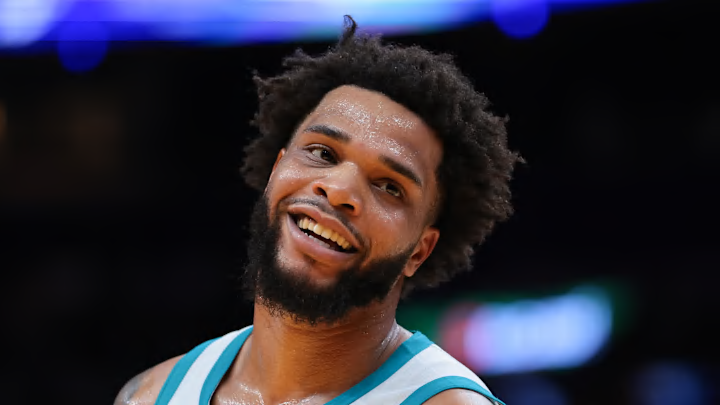For the first time in years, the Charlotte Hornets have a direction. LaMelo Ball, Brandon Miller, and Kon Knueppel form the foundation of a young, modern offense that prioritizes pace, shooting, and length. The frontcourt is filling out with Moussa Diabate and Ryan Kalkbrenner, and the team’s commitment to development is finally clear. Which makes one thing equally clear: Miles Bridges no longer fits the timeline.
That’s not an indictment of his game — it’s an acknowledgment of where Charlotte is headed. At 27, Bridges is still a productive scorer, averaging over 20.7 points and 7.2 rebounds per game. But with his contract expiring after this season (one year, roughly $25 million), he’s both valuable and expendable — a classic trade domino for a team looking toward the future
If the Hornets want to cash in before losing him for nothing, now is the time. Fortunately, there are logical trade partners who could turn Bridges into the assets Charlotte needs most: youth, flexibility, and draft capital.
Why Bridges still holds real trade value
Around the league, Bridges is viewed as a plug-and-play scoring forward — a proven 20-point producer who can create his own shot, rebound, and defend multiple positions in spurts. He’s not a No. 1 option, but he’s the perfect third guy on a contending roster.
His contract helps too. With one year remaining, he’s effectively a high-upside rental — giving contenders a win-now piece without long-term cap commitments. That’s exactly the type of deal that tends to generate movement before the trade deadline.
For Charlotte, trading Bridges isn’t about subtraction. It’s about rebalancing minutes for their young wings — Tidjane Salaun, Sion James, and Liam McNeeley — while adding future pieces that align with their timeline.
Trade idea no. 1: Bridges to Portland
Shipping Bridges to the Portland Trail Blazers for Jerami Grant and a 2026 first-round pick presents the cleanest framework for the Hornets. Portland wants off Jerami Grant’s long, expensive contract, and Charlotte has the cap room and patience to take it on — for a price.
The Blazers get younger and cheaper in the short term, while the Hornets pick up an additional 2026 first-round pick, potentially landing in one of the deepest upcoming drafts. Grant could serve as a temporary stretch-four and locker room veteran for Charlotte before becoming a movable contract himself later.
For Portland, Bridges’ shorter deal creates flexibility as their rebuild coalesces around Scoot Henderson and Shaedon Sharpe. It’s a financial and timeline win.
Trade idea no. 2: Bridges to Chicago
What if the Hornets pitch Bridges to the Chicago Bulls in exchange for Coby White? The proposal is more about fit than contracts. Chicago’s offensive structure remains clunky, and White — while talented — hasn’t quite carved out a defined role alongside Josh Giddey and Matas Buzelis.
Bridges would give the Bulls a more versatile forward option who could relieve their wing scoring load and bring athleticism to a half-court-heavy roster. Meanwhile, White fits Charlotte’s rebuild perfectly: a 24-year-old combo guard who can shoot, handle, and thrive in transition with LaMelo Ball.
White boasts a 36.9% career average from three, and some developing playmaking makes him an ideal backcourt partner in a system built around pace and spacing. It’s a trade that helps both teams refine their identities.
Trade idea no. 3: Bridges to Detroit
A swing-for-upside trade idea for Charlotte is to send Bridges to the Detroit Pistons, who could offer veteran Tobias Harris as an expiring salary, and send former top pick Jaden Ivey — who has been unable to find his footing due to injury — to Charlotte.
For the Pistons, Bridges is a hometown product and instant starter who aligns with the age of their emerging core. For the Hornets, this is the type of risk that could define their rebuild: adding a dynamic young guard in Ivey with star potential while clearing cap space in the process.
Charlotte gets both flexibility (Harris’ deal expires this summer) and upside (Ivey’s growth curve). It’s a classic short-term pain, long-term gain play.
Trade idea no. 4: Bridges to Los Angeles
If there’s a dream scenario for Hornets fans, this might be it: send Bridges to the Los Angeles Lakers for Austin Reaves and a salary filler. Reaves represents the kind of multi-skill guard the Hornets desperately lack — a secondary playmaker who can shoot, cut, and complement Ball and Miller.
For the Lakers, it’s about opportunity cost. If their tax bill grows unsustainable and they risk losing Reaves for nothing in the near future, flipping him for a productive two-way forward makes sense.
Charlotte could absorb salary, think Jarred Vanderbilt, and sweeten the deal by adjusting pick protections. They also would avoid trying to chase Reaves in free agency next summer. The Hornets would get a proven rotation guard, while the Lakers would upgrade in size and scoring for their playoff push.
The market and the moment
Bridges’ value sits in the sweet spot between “core piece” and “expiring rental.” Teams see him as a difference-maker but not a franchise cornerstone. That’s why the Hornets should be aggressively fielding offers.
There’s a market forming for reliable forwards who can score without volume and defend their position. There will be other teams that become potential dark horse options if the price is right.
What Charlotte can’t afford is indecision. Holding onto Bridges through the deadline risks losing him for nothing and clogging developmental minutes for the young wings that define their future.
Bridges remains a good player on the wrong timeline. His production and contract make him a clear trade asset, and Charlotte’s front office has a chance to use that leverage wisely.
Whether it’s Grant and a pick, a young guard like White, or a high-upside swing Jaden Ivey or Reaves, the Hornets’ focus should stay the same — convert present value into future flexibility.
For once, Charlotte has options. The only mistake now would be standing still.
